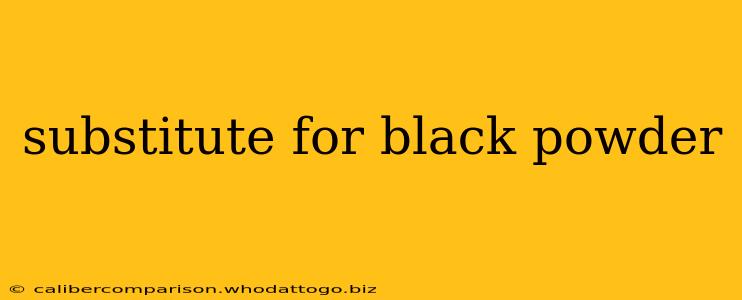Black powder, the quintessential propellant for firearms and fireworks for centuries, is increasingly facing restrictions due to its inherent dangers and environmental impact. This guide explores viable substitutes, examining their properties, applications, and limitations. Understanding the nuances of each alternative is crucial for safe and effective use.
Why Find a Substitute for Black Powder?
Black powder's popularity stems from its simplicity and readily available ingredients. However, its limitations are significant:
- Sensitivity: Black powder is highly sensitive to friction, sparks, and heat, making it dangerous to handle and store.
- Pollution: The combustion of black powder produces considerable smoke and toxic byproducts, harming both the environment and the shooter's health.
- Erosion: The corrosive nature of black powder's byproducts accelerates the wear and tear of firearms.
- Regulations: Increasingly stringent regulations restrict its sale and use in many areas.
Leading Black Powder Substitutes
Several alternatives offer varying degrees of safety and performance improvements:
1. Smokeless Powder: The Industry Standard
Smokeless powder is the most common black powder substitute, offering vastly improved safety and performance. It burns cleaner, produces less smoke and residue, and is far less sensitive to accidental ignition. However, it's crucial to understand that different types of smokeless powder are formulated for specific applications (e.g., pistol vs. rifle) and should never be interchanged. Improper use can lead to serious injury or firearm damage.
Advantages:
- Significantly reduced smoke and residue
- Higher velocity and energy
- Less corrosive
- Safer handling
Disadvantages:
- More expensive than black powder
- Requires specific firearms designed for smokeless powder
2. Pyrodex: A Popular Black Powder Substitute
Pyrodex is a popular black powder substitute designed for use in muzzleloading firearms. It's relatively clean-burning and produces less smoke than black powder, but it's still considered a "black powder substitute" and might not be suitable for all applications. Always check your firearm's manual before using Pyrodex.
Advantages:
- Cleaner burning than black powder
- Reduced smoke and fouling
- Relatively easy to clean up
Disadvantages:
- Not as powerful as smokeless powder
- Can still be corrosive if not cleaned properly
3. Triple Seven: Another Muzzleloading Option
Triple Seven is another black powder substitute primarily used in muzzleloading firearms. Similar to Pyrodex, it's designed to mimic the characteristics of black powder while reducing some of its drawbacks. Its performance and safety profile are comparable to Pyrodex.
Advantages:
- Cleaner burning than black powder
- Less fouling
- Relatively easy to clean up
Disadvantages:
- Not as powerful as smokeless powder
- Still requires careful cleaning
4. Alternative Propellants for Specific Applications
Beyond the common substitutes, other propellants exist for specialized applications:
- Electric Matches: Used in some firearms, these provide a safe and consistent ignition source without the use of any powder.
- Compressed Air: Used in some air rifles and other pneumatic devices, compressed air provides a clean and powerful alternative.
- Propellant-less Systems: Some systems utilize springs or other mechanical means to propel projectiles, eliminating the need for any propellant.
Choosing the Right Substitute
The best substitute for black powder depends entirely on the application. For modern firearms, smokeless powder is the clear winner. However, for muzzleloading enthusiasts, Pyrodex and Triple Seven provide cleaner-burning options while retaining a feel reminiscent of traditional black powder. Always prioritize safety and consult the manufacturer's instructions and your firearm's manual before using any substitute. Ignoring this advice can have serious consequences.

